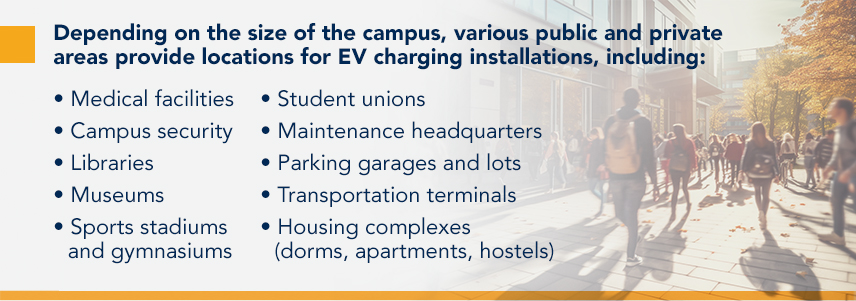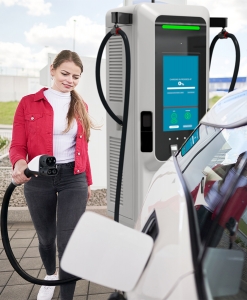
Books, computers, backpack, snacks, comforter—now add a new item to the traditional checklist of dorm essentials and meal plans—EV charging stations. Statistics reveal that young Americans between 18 and 29 years old represent the age group most likely to consider the purchase of an electric vehicle, up to 55% of this cohort. That means college campuses are witnessing an influx of EVs, among students, faculty, and visitors.
The need for colleges and universities to install EV charging infrastructure extends beyond passenger vehicles to campus maintenance fleets, public transportation, and more. Larger colleges and universities often play host to major sporting events, for example, when demand for EV charging can spike dramatically. Variable usage trends make it essential for institutions to plan for both daily use and peak demand scenarios.
Current state of campus EV charging
Leading institutions across the country are already taking steps to meet this growing need. As one example, consider the steps taken by Stanford University. Stanford, located in the heart of the Bay Area, has a comprehensive EV plan as part of a broader sustainability initiative and has installed numerous charging stations across campus parking facilities. The University of California system has committed to a significant expansion of EV infrastructure across all its campuses, recognizing the vital role it plays in meeting sustainability goals and serving its community’s needs.1
Some universities are exploring innovative payment models for student charging. While most currently utilize pay-per-use systems, others are investigating the integration of charging costs into existing student service packages. This could potentially include charging credits as part of parking permits or residential life packages, similar to methods used for laundry services that are often bundled into housing costs.

Environmental challenges and EV charger campus considerations
Geographic location and environment can significantly impact charging infrastructure planning. Cold-weather campuses, for example, face unique challenges, with battery capacity potentially reduced by 20% or more during winter months. In this instance, campuses should offer indoor charging options and equipment rated for extreme temperatures. They can also review options for commercial EV chargers designed for inclement weather conditions.
Campuses in hot, arid regions might consider special options, including shade structures and possibly cooling systems for charging equipment. Maintenance protocols can be adjusted to address dust protection and moisture-resistant connections for more reliable operation. Again, commercial EV chargers can offer equipment designed for hostile environments. Work with an EV charger manufacturer to find the right charger for your environment.
While some campuses span hundreds of acres, more compact or urban campuses can optimize limited space through vertical parking structures while coordinating with local utility grids. Whatever the setting, campuses can integrate security measures such as integration with campus ID systems for controlled access or program chargers for different payment options, including credit cards.

EV charger benefits beyond basic necessity
Installing comprehensive EV charging infrastructure offers universities multiple advantages:
- Environmental leadership: It demonstrates a tangible commitment to sustainability goals and carbon reduction targets, enhancing the institution’s reputation as an environmental leader.
- Recruitment tool: As more families consider EVs for their college-bound students, robust charging infrastructure can become a meaningful differentiator in college selection.
- Revenue generation: Commercial EV charging stations, particularly at high-traffic locations like athletic facilities, can provide a new revenue stream while offering an essential service.
- Future readiness: With major automakers committing to electric vehicle production, universities that invest in charging infrastructure now will be better positioned for the inevitable increase in demand.

Community integration and EV charger revenue opportunities
Universities can extend their charging infrastructure to serve the surrounding communities, creating additional revenue streams while supporting local EV adoption:
- Off-campus student housing: Partner with nearby apartment complexes to extend charging networks
- Community access programs: Offer charging subscriptions to local residents, particularly in areas where home charging may be limited
- Dynamic pricing: Implement time-of-use rates that optimize usage between student needs and community access
- Local business partnerships: Collaborate with nearby businesses to create charging hubs that serve both campus and community needs
Strategic implementation solutions
For universities developing their EV charging infrastructure, selecting appropriate charging technology is crucial. Level 2 charging stations provide cost-effective solutions for residential areas and overnight parking, ideal for dormitory lots and regular faculty use. These stations can integrate seamlessly with existing campus card systems and parking management.
BTC POWER’s Level 2 AC product family provides access to certified, reliable charging solutions. These AC charging stations offer:
- Choice of single or double ports
- Various Amps ranging from 30-80
- Pedestal or wall-mount style for parking garages near stadiums or dorms
- Fully calibrated, tested, and sealed
- Supports various authentication methods and programmable to accommodate campus ID cards, RFID, credit card, QR code and mobile app payments
BTC POWER’s All-in-One (AiO) DC Fast Chargers deliver Level 3 rapid charging for high-traffic campus areas:
- 10-15 minute charging sessions ideal for commuter lots
- Large touchscreens (15″ or 32″) for campus messaging and events
- Multiple payment options, including student ID integration
- Liquid-cooled cables enabling 500A continuous charging
- Ideal for athletic facilities, visitor centers, and campus events

Taking Action
As the EV revolution accelerates, universities should take action now to install a strategically planned charging infrastructure. BTC POWER offers its expertise to help educational institutions plan and implement infrastructure to support current demands while allowing space for future growth. Keep in mind that you’ll need a commercial EV charger capable of handling strain and frequent use.
Ready to electrify your campus? Contact BTC POWER today to learn about its customized charging solutions for educational institutions, retail outlets, offices, medical centers and more. As the leading EV charger manufacturer in North America, its team of experts can help assess your needs, design an optimal charging network, and implement a system that serves your entire campus community, from residential centers or dorms to event visitors, bookstores, and medical treatment centers.
Visit www.btcpower.com to explore its full range of charging solutions and begin your journey toward a fully electrified future on campus.

